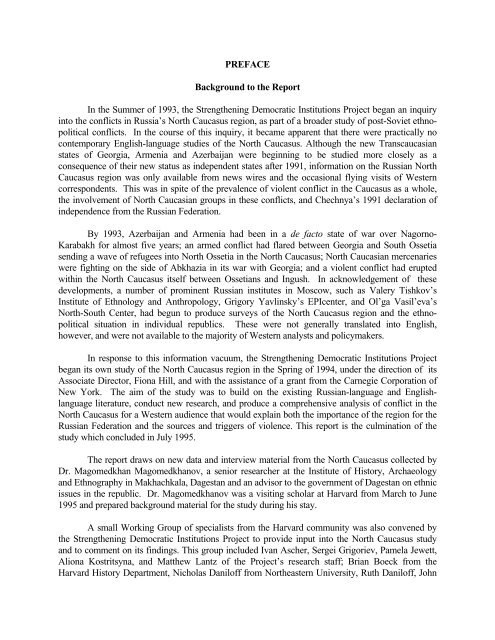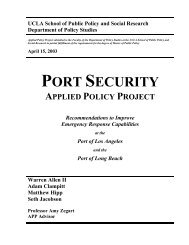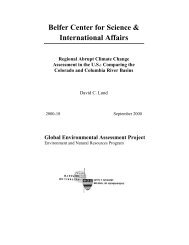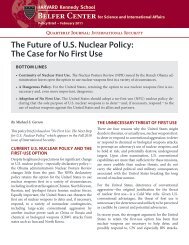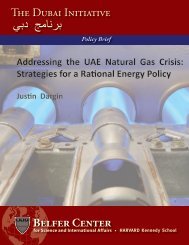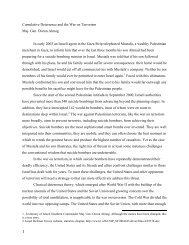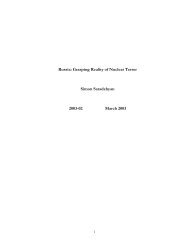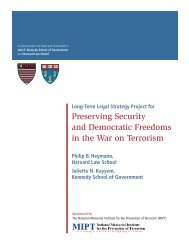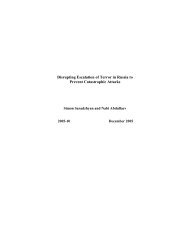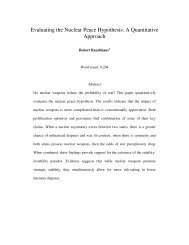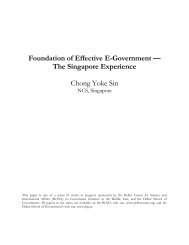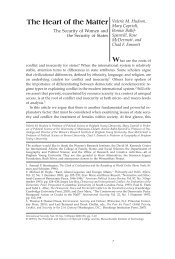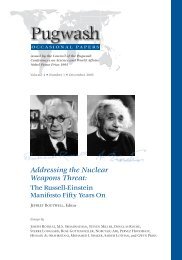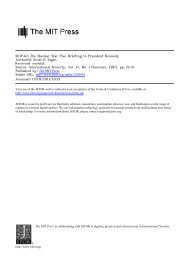RUSSIA'S TINDERBOX - Belfer Center for Science and International ...
RUSSIA'S TINDERBOX - Belfer Center for Science and International ...
RUSSIA'S TINDERBOX - Belfer Center for Science and International ...
Create successful ePaper yourself
Turn your PDF publications into a flip-book with our unique Google optimized e-Paper software.
PREFACE<br />
Background to the Report<br />
In the Summer of 1993, the Strengthening Democratic Institutions Project began an inquiry<br />
into the conflicts in Russia’s North Caucasus region, as part of a broader study of post-Soviet ethnopolitical<br />
conflicts. In the course of this inquiry, it became apparent that there were practically no<br />
contemporary English-language studies of the North Caucasus. Although the new Transcaucasian<br />
states of Georgia, Armenia <strong>and</strong> Azerbaijan were beginning to be studied more closely as a<br />
consequence of their new status as independent states after 1991, in<strong>for</strong>mation on the Russian North<br />
Caucasus region was only available from news wires <strong>and</strong> the occasional flying visits of Western<br />
correspondents. This was in spite of the prevalence of violent conflict in the Caucasus as a whole,<br />
the involvement of North Caucasian groups in these conflicts, <strong>and</strong> Chechnya’s 1991 declaration of<br />
independence from the Russian Federation.<br />
By 1993, Azerbaijan <strong>and</strong> Armenia had been in a de facto state of war over Nagorno-<br />
Karabakh <strong>for</strong> almost five years; an armed conflict had flared between Georgia <strong>and</strong> South Ossetia<br />
sending a wave of refugees into North Ossetia in the North Caucasus; North Caucasian mercenaries<br />
were fighting on the side of Abkhazia in its war with Georgia; <strong>and</strong> a violent conflict had erupted<br />
within the North Caucasus itself between Ossetians <strong>and</strong> Ingush. In acknowledgement of these<br />
developments, a number of prominent Russian institutes in Moscow, such as Valery Tishkov’s<br />
Institute of Ethnology <strong>and</strong> Anthropology, Grigory Yavlinsky’s EPIcenter, <strong>and</strong> Ol’ga Vasil’eva’s<br />
North-South <strong>Center</strong>, had begun to produce surveys of the North Caucasus region <strong>and</strong> the ethnopolitical<br />
situation in individual republics. These were not generally translated into English,<br />
however, <strong>and</strong> were not available to the majority of Western analysts <strong>and</strong> policymakers.<br />
In response to this in<strong>for</strong>mation vacuum, the Strengthening Democratic Institutions Project<br />
began its own study of the North Caucasus region in the Spring of 1994, under the direction of its<br />
Associate Director, Fiona Hill, <strong>and</strong> with the assistance of a grant from the Carnegie Corporation of<br />
New York. The aim of the study was to build on the existing Russian-language <strong>and</strong> Englishlanguage<br />
literature, conduct new research, <strong>and</strong> produce a comprehensive analysis of conflict in the<br />
North Caucasus <strong>for</strong> a Western audience that would explain both the importance of the region <strong>for</strong> the<br />
Russian Federation <strong>and</strong> the sources <strong>and</strong> triggers of violence. This report is the culmination of the<br />
study which concluded in July 1995.<br />
The report draws on new data <strong>and</strong> interview material from the North Caucasus collected by<br />
Dr. Magomedkhan Magomedkhanov, a senior researcher at the Institute of History, Archaeology<br />
<strong>and</strong> Ethnography in Makhachkala, Dagestan <strong>and</strong> an advisor to the government of Dagestan on ethnic<br />
issues in the republic. Dr. Magomedkhanov was a visiting scholar at Harvard from March to June<br />
1995 <strong>and</strong> prepared background material <strong>for</strong> the study during his stay.<br />
A small Working Group of specialists from the Harvard community was also convened by<br />
the Strengthening Democratic Institutions Project to provide input into the North Caucasus study<br />
<strong>and</strong> to comment on its findings. This group included Ivan Ascher, Sergei Grigoriev, Pamela Jewett,<br />
Aliona Kostritsyna, <strong>and</strong> Matthew Lantz of the Project’s research staff; Brian Boeck from the<br />
Harvard History Department, Nicholas Daniloff from Northeastern University, Ruth Daniloff, John


